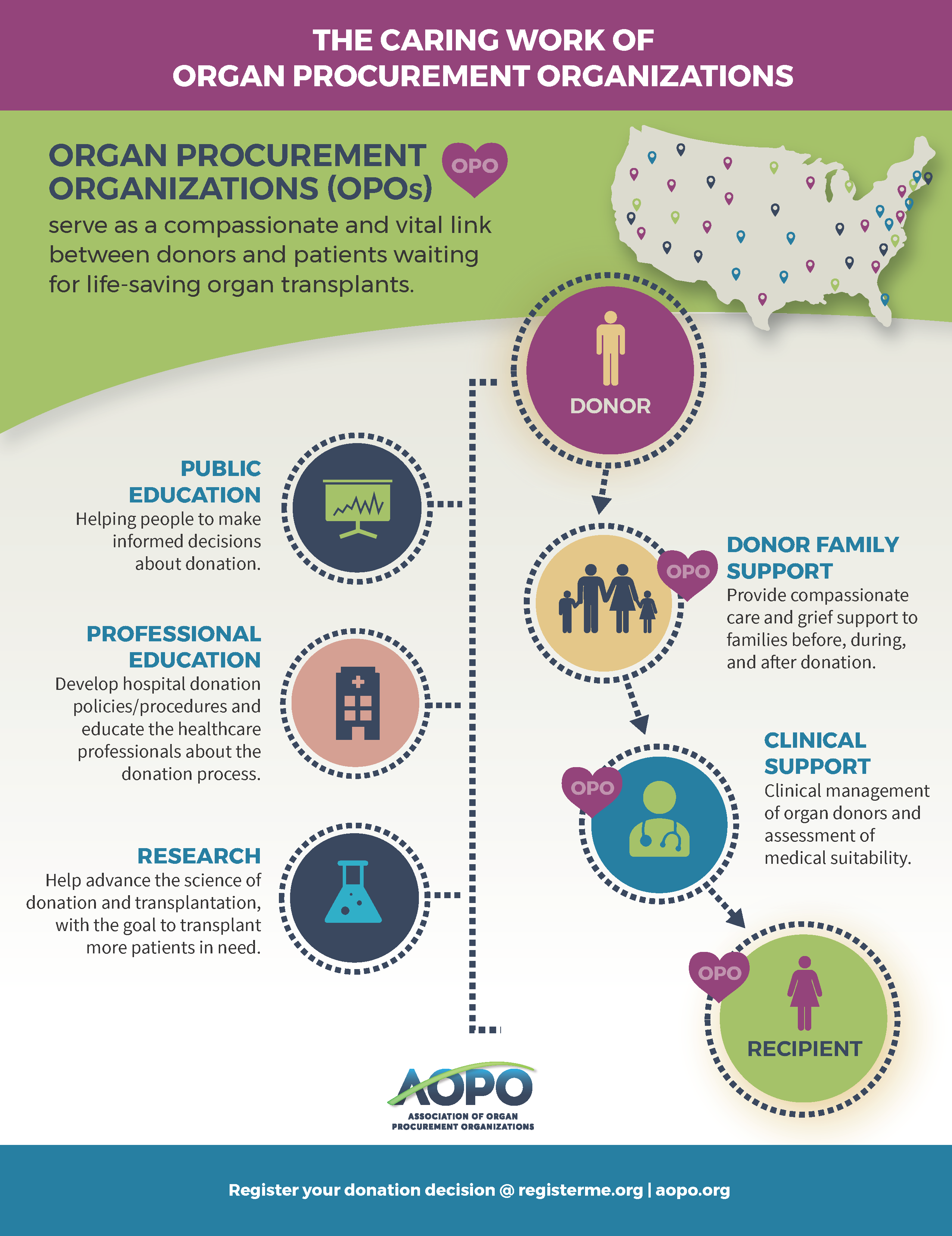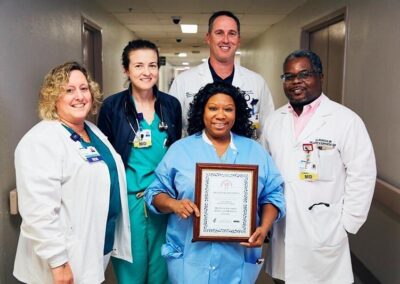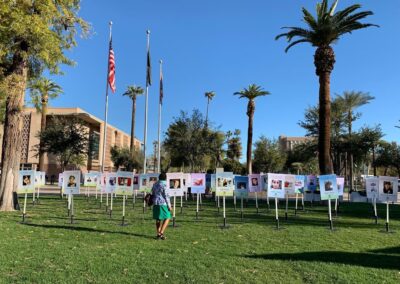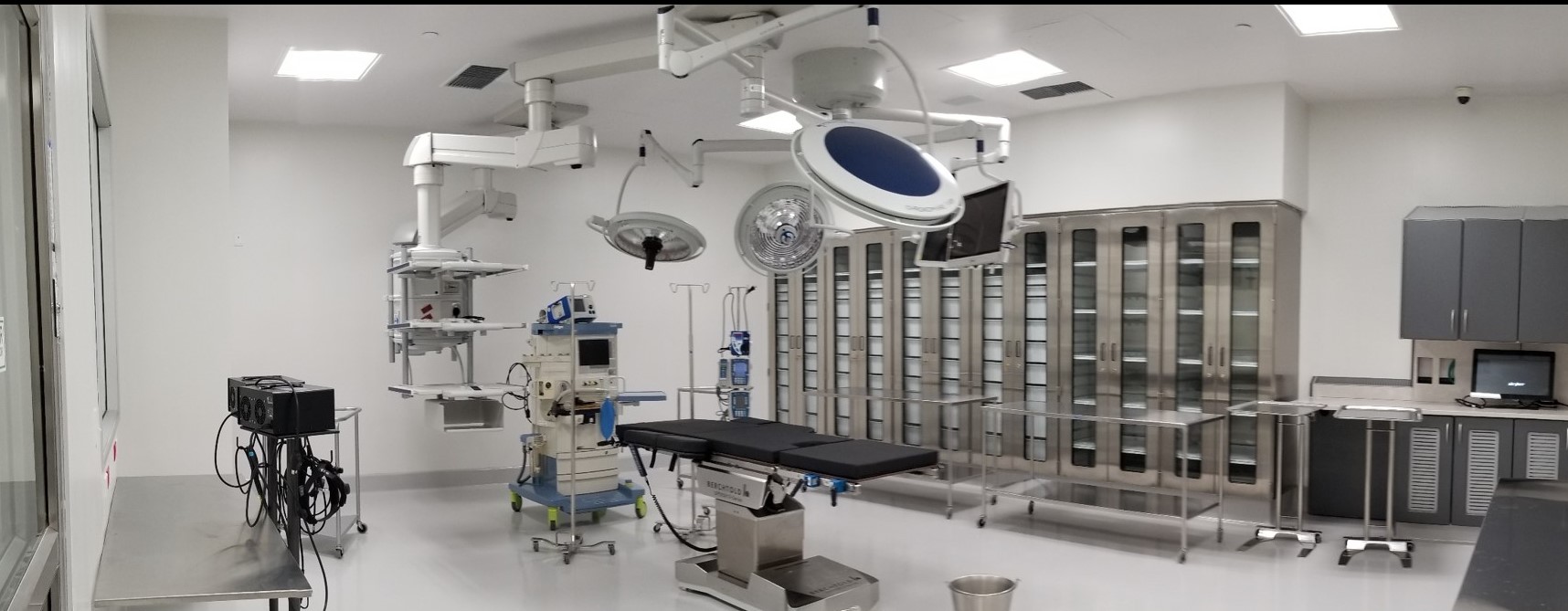Organ Procurement Organizations (OPOs) represent a unique component of health care. By federal law, not-for-profit OPOs are the only organizations that can perform the life-saving mission and serve as the vital link between donors and patients waiting for life-saving organ transplants.
OPOs provide many services such as:
- Facilitation of the donation process according to federal regulations.
- Clinical management of organ donors and assessment of medical suitability.
- Provide compassionate care and grief support to families before, during, and after donation.
- Public education for people to make informed decisions about donation.
- Development of hospital donation policies/procedures and healthcare professional education.
When the National Organ Transplant Act (NOTA) was signed into law in 1984 it created the national Organ Procurement and Transplantation Network (OPTN) for matching donor organs to waiting recipients. The OPTN both standardized the process through which organs are donated and shared across the country and created the system of federally-designated Organ Procurement Organizations (OPOs) throughout the United States and its territories. The OPTN includes all OPOs and transplant centers and is managed under contract by the United Network for Organ Sharing (UNOS). All OPOs are regulated by multiple government agencies and adhere to the highest medical and ethical standards.
Donor Family Support
Donor families deserve compassionate support as their loved one gives the gift of life. OPOs are dedicated to serving these precious families and providing resources and information to help them on their grief journey and lead individuals on a path to healing. Many OPOs hold annual remembrance events for donor families, offer the opportunity to submit a quilt square or remembrance item, or simply make their staff available to listen and support them throughout and after the grief process.
OPOs are also a vital part of connecting donor families and recipients through letters and, sometimes, direct contact. OPOs offer post donation services and aftercare for family members, including writing letters with general information about individuals who received their loved one’s donated organs and tissues. Letters are also written to the physicians and nurses who helped care for the donor at the area hospital. One organ, eye, and tissue donor can save or enhance the lives of more than 75 recipients.
Clinical Support
Saving lives through organ and tissue donation and transplantation is a 24 hour, seven day-per week responsibility. OPOs coordinate the recovery of organs and tissues for transplant. The complex organ and tissue donation and transplant process involves collaborating with highly skilled medical professionals at many different levels.
Donor Evaluation
After authorization to donate is obtained, the OPO coordinator reviews the patient’s medical history for information important to determining which organs and tissues are suitable for transplant.
In collaboration with the hospital team, the patient’s opportunity to donate is maintained to ensure the organs stay healthy for transplant.
Matching organ donors with transplant patients
OPOs begin the process of matching the potential donor with a candidate on the list of patients awaiting transplants maintained by the federally regulated United Network for Organ Sharing (UNOS).
The list of individuals awaiting an organ transplant is sorted by a patient’s medical urgency, degree of match to the donor, time on the waiting list and geographic location. The list does not reference race, gender, age, income or social status. The transplant surgeon is responsible for making the decision whether to accept the organ for transplant.
Surgical Preparation, Recovery, and Transplant
The OPO donation coordinator arranges the arrival and departure times of the surgical recovery transplant teams. In addition, the coordinator is present to manage the entire recovery process where organs and tissues are recovered through a dignified surgical procedure.
Once the organ recovery is complete, the donor family can make final arrangements with a funeral home. Typically, there are no special needs involved for the funeral home after organ and tissue donation.
Professional Education
OPOs rely on the strong partnership of hospitals and transplant centers to facilitate the generous gifts of organ and tissue donation. Hospital development/services involve a team of passionate liaisons who work collaboratively with the healthcare team to provide education and training on donation and transplantation; develop appropriate communication plans; support families; and help maximize the gifts of donation and transplantation.
OPOs also have liaisons who work closely with medical examiners, coroners and funeral directors throughout the referral and evaluation process. These joint efforts expand the donation options for potential donors and donor families, while preserving evidence for death investigations to determine the cause and manner of death.
Public Education
The gifts of organ and tissue donation are only possible through the generosity of others. OPOs provide public education about donation to help individuals make an informed decision and increase the number of people who decide to give this life-saving gift or whose families honor them by making the decision after death.
Public education efforts often include youth education through high school and driver’s education programs, partnerships with driver’s license bureaus, workplaces, faith-based outreach, media relations and a wide variety of community events. The goal is the same at all OPOs – to encourage the people in the communities they serve to legally register as a donor and share the gift of life.
Register to become a donor by going to RegisterMe.org
Tissue Donation and Research
Many OPOs also facilitate the gift of tissue donation and research. The gift of donated tissue can help people in a variety of ways. The stories of lives changed, and sometimes saved, by generous donors are countless. Tissue donation includes donated grafts such as skin, bone and heart valves to heal and restore the quality of life for recipients. OPOs facilitate research to help advance the science of donation and transplantation, with the ultimate goal to transplant more patients in need.






